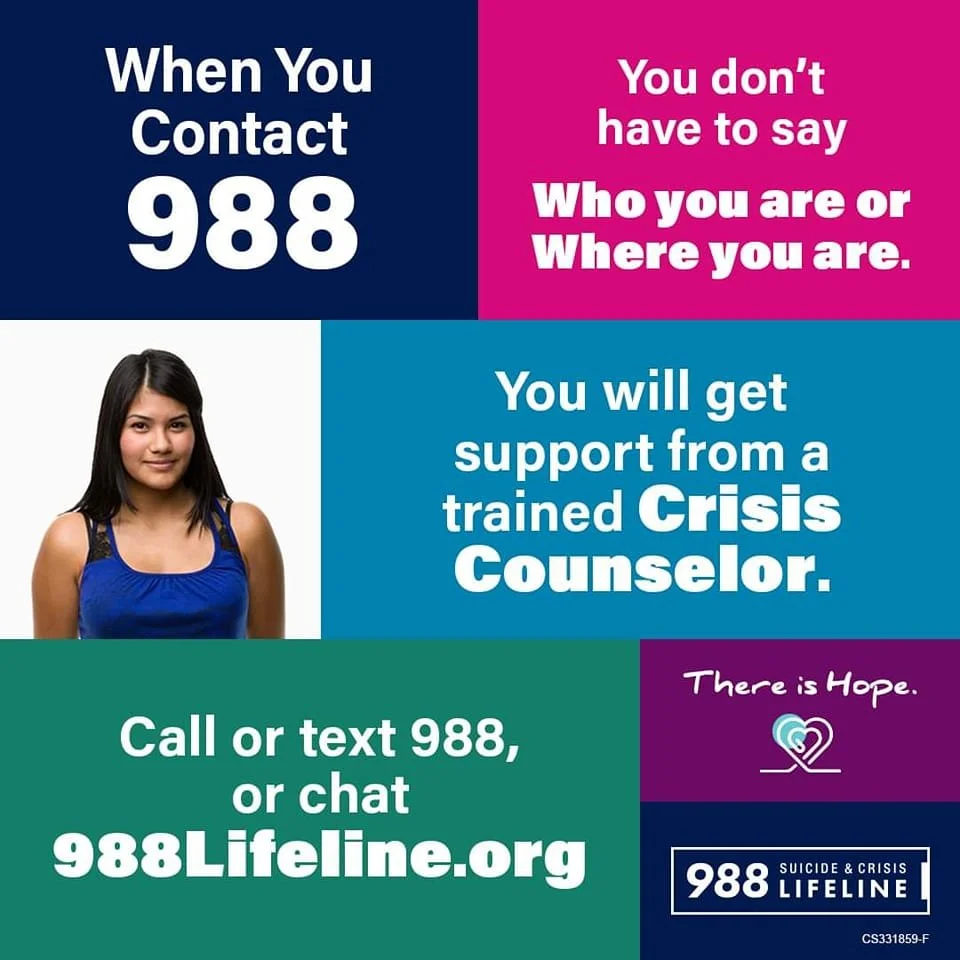Find help
Suicide Hotline: (800) 273-TALK or (800) SUICIDE






I’m looking for mental health help for myself.
Which of the following best describes you?
I’m in crisis.
Call 1-800-273-TALK (8255) to reach a 24-hour crisis center
Text MHA to 741741
Call 911
Go to the nearest emergency room.
I don’t have any concerns right now, but I’d like to stay mentally healthy.
Monitor your mental health regularly by taking one of our Nine Validated Screens.
Learn about ways to live well and stay well.
Read up on risk factors and early warning signs.
Get tips for boosting your mental health.
I think I’m showing symptoms of a mental health condition. I’m doing okay at home, work, or school. but not as easily as before. Something is “not right”.
Take a mental health screen, print the results out, and bring them to a doctor or a mental health provider. Or discuss the results with a family member or close friend.
Try out our interactive "where to get help” feature.
Find an affiliate in your community.
Learn more about mental health conditions.
Read up about the different treatments.
Get tips for starting a conversation with a friend or loved one about your mental health.
Use this exercise to combat negative thoughts and other cognitive distortions.
Think ahead and map out steps you can take to get help and feel better.
I’m starting to have trouble with family, friends, work, school, or other areas of my life. Things are getting worse, and sometimes multiple problems seem to be developing.
Take a mental health screen, print the results out, and bring them to a doctor. Or discuss the results with a family member or close friend.
Try out our interactive “where to get help” feature.
Learn more about mental health conditions.
Use a worksheet to help you learn how to communicate your thoughts and emotions.
Things are getting bad. I’m losing control of my life and ability to work, go to school, and be present with friends and family.
Call 1-800-273-TALK or text MHA to 741741 if you are in crisis.
Plan for crisis by setting up a Psychiatric Advance Directive.
Read more about inpatient options.
Prepare yourself to have open-ended conversations with a mental health professional.
I’m looking for mental health help
for someone I know.
Which of the following best describes the person you care about?
The person I care about is in crisis.
Call 1-800-273-TALK (8255) to reach a 24-hour crisis center
Text MHA to 741741
Call 911
Help them to the nearest emergency room.
Learn about rights and resources as a caregiver of a person with a mental illness
The person I care about does not have any concerns right now, but they would like to stay mentally healthy.
Encourage them to monitor their mental health regularly by taking one of our Nine Validated Screens.
Learn about ways to live well and stay well. Follow these tips yourself, or share with the person you care about.
Read up on risk factors and early warning signs.
Get tips for boosting mental health.
The person I care about is showing symptoms of a mental health condition. They are doing okay at home, work, or school, but not as easily as before. Something is “not right”.
Encourage them to take a mental health screen, print the results out, and bring them to a doctor or a mental health provider.
Suggest our interactive "where to get help” feature.
You can contact an affiliate as a concerned party or encourage the person you care about to do so. There may be limits to what someone else can share.
Learn more about mental health conditions. Get informed so you can be a good caretaker.
Read up about the different treatments.
Use this worksheet with a friend or loved one to think ahead and map out steps they can take to get help and feel better.
If you are the parent of a child or teen who is showing signs of a mental health problem:
Get tips for starting a conversation
Learn more about what to do and where to go
The person I care about is starting to have trouble with family, friends, work, school, or other areas of their life. Things are getting worse, and sometimes multiple problems seem to be developing.
Take a mental health screen, print the results out, and bring them to a doctor. Or discuss the results with a family member or close friend.
Try out our interactive “where to get help” feature.
Look up your local MHA affiliate.
Learn more about mental health conditions.
Find strategies to support a friend or loved one who is dealing with a mental illness.
Things are getting bad for the person I care about. They appear to be losing control of their life and ability to work, go to school, or be present with friends and family.Call 1-800-273-TALK or text MHA to 741741 if you are in crisis.
Look up your local MHA affiliate for services in your area.
Plan for crisis by setting up a Psychiatric Advance Directive.
Read more about inpatient options.
Learn about how you can support a friend or loved one who is dealing with a mental illness.
Common Treatment Types
You’ve decided to get help—that itself is a big step—now it’s important that you understand options for treatment. You may end up trying a few different options or a combination of treatments, not just one. That’s okay—it is all about what works best for you.
Therapy
There are many approaches to therapy for individuals and groups, including cognitive behavioral therapy
Provided by: Psychologists, Licensed Clinical Social Workers (LCSWs), Licensed Mental Health Counselors (LMHCs), Pastoral Counselors, other specialists like Marriage and Family Therapists, some Psychiatrists, Inpatient Care, Hospital.
Medication
Medications aren’t cures, but they can treat symptoms. Every medication has benefits, risks, and side effects. Keep in mind that it may take 6-8 weeks for a medication to have its full effect.
Provided by: Psychiatrists, Other Medical Doctors, Nurse Practitioners and Physician’s Assistants (under supervision of a doctor), Inpatient Facilities, Hospitals. Some psychologists with special training may also be able to write prescriptions.
Peer Support
While they aren’t counselors, peers can give valuable insight on how to recover from mental health conditions because they have experience. Peers provide hope, education and advocacy.
Provided by: Certified Peer Specialists, Peer Supporters, Support Groups, Online Support Communities
Community-Based Services
Community-based mental health services are team approaches that help you and your family work on all aspects of life and recovery. Common community services include: evaluations of your mental health and role in the community, education to empower personal recovery, individual and group therapy, case management, and supported education and employment. These services are provided through small or large programs and while some work might be completed in an office, most of the treatment is provided at your home and in your natural environment.
Provided by: Local MHAs, Community Mental Health Treatment organizations and programs.
Check out the SAMHSA Treatment Locator at findtreatment.samhsa.gov
Complementary And Alternative Medicine
Many Americans, nearly 40 percent, use health care approaches developed outside of mainstream Western, or conventional, medicine for specific conditions or overall well-being. The most commonly used natural product among adults in the past 30 days was fish oil/omega 3s (reported by 37.4 percent of all adults who said they used natural products). (1)
Provided by: Doctors, Pharmacies, Internet (Caution advised—some natural supplements can have serious interactions with medications. Always discuss Complementary and Alternative treatments with a doctor.)
Learn More About Complementary And Alternative Medicine
Self-Care
Self-care can include online, self-managed programs like Beating the Blues, which can improve the symptoms of anxiety and depression. (2) It can also include things like exercise, which can have a moderate effect on depression. (3)
Provided by: You
Managing Expectations
Even if you have insurance, not all providers may accept it.
Everyone’s insurance works differently. If you need help, check out our guide on How Insurance Works.
It might take some time to see a provider.
Sometimes making an appointment and then waiting for an appointment might take a bit of time. If you are in more immediate need, call a national, state, or local crisis line for help.
Some areas might not offer the type of care you are looking for.
This can happen because of your location (if you live in a rural area, you may have to travel a long distance to find a therapist) or because providers in your area don’t offer the supports you need (like community-based services). Be prepared to consider alternatives, look for care virtually, or travel to a location that does offer what you are looking for.
Some mental health care costs money.
If you need help paying for treatment, visit Paying For Care.
Your first provider may not be “the one”. And that’s okay.
Choosing a mental health provider can sometimes need a test run or two. Sometimes, you’re just not compatible with a certain provider. You may have to change providers before you feel comfortable. While it can feel like a hassle, it’s worth it to find the right fit.
Some people may be critical or doubtful.
More than half of people believe that others are caring and sympathetic to individuals that struggle with their mental health, however that may not always be the case. You may encounter some naysayers, but there are also people who will support you and want you to get better. If you don’t have them in your life, you can find them in support groups or online communities.

